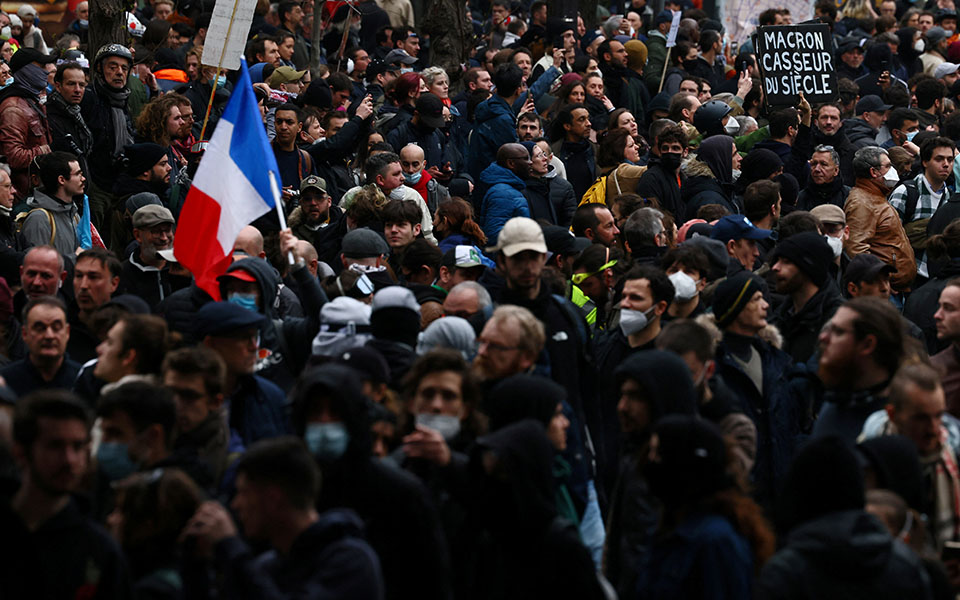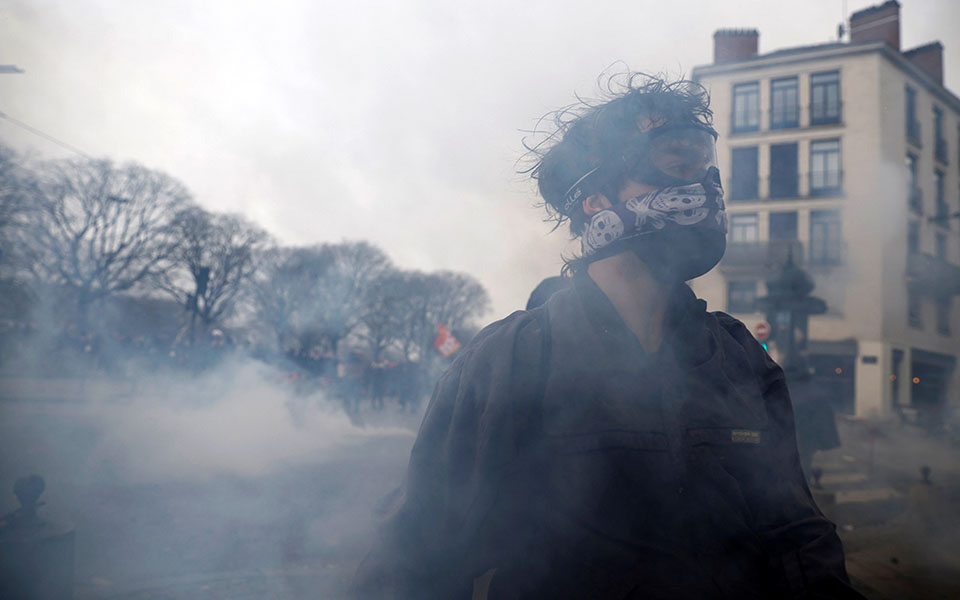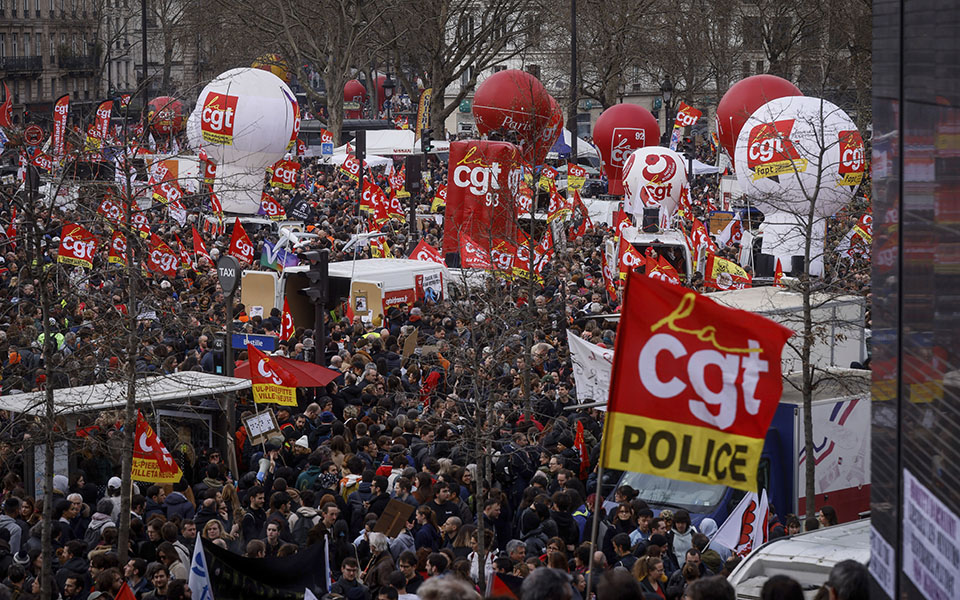
From the moment that Emmanuel Macron decided to “activate” – in the opinion of many – the controversial Article 49.3, bypassing the National Assembly in the process of implementing state pension reform, this was in view of the fact that today will be a day of cinematic “intensity” in France. After months of protests against the government’s bill, the French were again massively on the “streets”, not missing the protracted episodes concentrated in Paris.
The streets of France were filled – for the ninth time since January 19 – with protesters who renewed their opposition to Macron’s reforms. According to the Ministry of Internal Affairs, about 1 million citizens took part in protests across the country, and about 120 thousand people took part in the streets of Paris. Far different from the government’s official statement were estimates from the CGT union, which said there were more than 3.5 million protesters across the country and 800,000 in the capital alone.
The evolution of strike movements
“Mobility” was widespread in Paris from a very young age. According to Le Monde, one of the first actions of the demonstrators on the day of today’s strike was to block the entrance to some parts of the Charles de Gaulle airport. At the same time, according to the national railway operator, more than half of the train traffic was canceled, and the unions said that more than a third of the train staff would join the strike.
At the same time, the “transitional” strike of cleaners continues until Monday, and bags with thousands of tons of garbage accumulated in the capital have become a “symbol” of mobilizations against Macron’s reform.

However, the “fever” of mobilizations caught not only Paris. Instead, more than 250 demonstrations took place across the country, with protesters chanting slogans and holding signs against Macron but against Prime Minister Elisabeth Bourne. Moreover, at the initiative of Born, provision 49.3 was “activated” bypassing the National Assembly and establishing, among other things, raising the retirement age from 62 to 64 years. It is noted that the protesters also targeted oil depots, blocking the LNG terminal in the city of Dunkirk.
Episodes, roadblocks and chemicals
In the afternoon and at the height of the protests, there were tensions and incidents in the French capital. Police forces used tear gas to disperse the protesters, and shortly before dark, the focus of clashes fell on the Opera area, where groups of protesters set fire to objects. The atmosphere in a certain place became especially tense due to the fact that police forces stepped up their presence to protect firefighters who at that time were working to extinguish fires existing on the streets of the city. According to Le Monde, 172 people were arrested, while there is information about 149 injured police officers. While Reuters reports that unknown attackers caused significant property damage to department stores, and police used chemicals and stun grenades extensively. In addition, the “aura” of the police was used, which launched water with great pressure.
It is noted that unions have expressed concern that the protests could become more violent if the government does not heed the growing popular anger. However, it has already been announced that next Tuesday, March 28, will also be a strike day, with unions saying the mobilizations are a response to Macron’s “incomprehensible stubbornness”. at the same time, they make it clear that the explosive atmosphere and tension only put pressure on the “unyielding” French president.

Escalation of anger a day after Macron’s interview
Finding himself in perhaps the biggest political crisis of his presidency, Macron made his first public appearance yesterday since implementing 49.3. The President of France, although he tried to appear more consensual and ready to reopen the channel of communication with the unions, essentially remained adamant about the “necessity” of implementing the proposed pension changes. He spoke of the “unpopular” option he “necessarily” takes to save the insurance system, while acknowledging that so far his government has failed to convince most French people of the content of the measures. He expressed his confidence in Prime Minister Bourne, and regarding the mobilization he explained that he “respects the democratic right to demonstrate and strike”, but added that “violence is unacceptable”.
And if Macron aimed his interview to calm the backlash and create a sense of de-escalation – he promised a brief return to normality – the climate of today’s mobilizations highlights the ingrained climate of anger in much of French society.
The Guardian notes that Macron’s TV appearance yesterday “infuriated” not only those directly interested in changes to the pension system, but also the country’s youth. The same publication also touches on another, less well-known aspect of the topic, regarding women participating in the mobilization. For many women who have spent years raising children, putting their careers on the backburner, or for women who have received low wages and worked in exploitative conditions, the bill is a “double punishment”, according to the Guardian.

The doors of Bordeaux City Hall were set on fire as French police clashed with demonstrators amid nationwide pension protests. https://t.co/f2bCYlNQIC pic.twitter.com/m9aEJHx0nd
— ABC News (@ABC) March 23, 2023
As of Thursday evening, Paris and other parts of France are still on fire with no immediate de-escalation on the horizon. Macron said in an interview that rising unpopularity rates don’t bother him, as he knows he’s doing the right thing. He also noted that the only mistake he admits is that he failed to convince the French of the need for his reform. A day later, protesters in Paris set up makeshift barricades and the door of Bordeaux city hall was set on fire as unions prepared for the next big strike on Tuesday.
Source: Kathimerini
Anna White is a journalist at 247 News Reel, where she writes on world news and current events. She is known for her insightful analysis and compelling storytelling. Anna’s articles have been widely read and shared, earning her a reputation as a talented and respected journalist. She delivers in-depth and accurate understanding of the world’s most pressing issues.